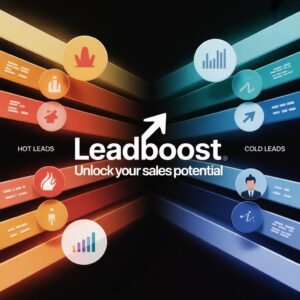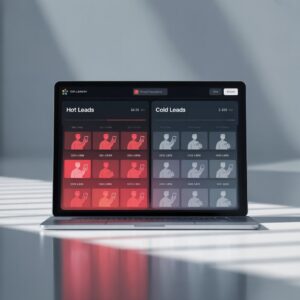In the fast-paced world of sales and marketing, knowing how to approach different types of leads can make or break your conversion rates. One of the most crucial distinctions to understand is Hot vs. Cold Leads. These terms might sound simple, but they carry deep implications for how you communicate, follow up, and ultimately close deals.
In this blog, we’ll break down what hot and cold leads really are, why the distinction matters, and most importantly, how to effectively manage each type to grow your business.
What Are Hot and Cold Leads?
Hot Leads: Ready to Buy
Hot leads are prospects who are highly interested in your product or service and are likely ready to make a purchase decision soon. These leads have often:
-
Interacted with your sales team
-
Requested a demo or quote
-
Shown urgency in their inquiries
-
Met specific qualifying criteria (budget, authority, need, and timeline)
Example: Jane visits your website, downloads a pricing sheet, books a demo within 24 hours, and asks detailed questions about onboarding. She’s clearly a hot lead.
Cold Leads: The Slow Starters
Cold leads are individuals or businesses that are aware of your brand but haven’t shown strong buying intent yet. These might include:
-
Visitors who download a free resource but never follow up
-
Leads added from purchased lists or cold outreach
-
Contacts from networking events or tradeshows without follow-through
Example: Mike received your newsletter through a sign-up at a trade show six months ago but hasn’t opened an email since. He’s a cold lead, at least for now.
Understanding the hot vs. cold leads spectrum is key to building a more personalized, effective sales funnel.
Read More Blog: How to Get Reviews on Facebook & Manage Them Like a Pro
Why It’s Important to Distinguish Between Hot and Cold Leads
Mixing up your lead types is like baking a cake and mistaking sugar for salt — the results won’t be sweet.
If you approach cold leads with a hard sell, you’ll likely drive them away. On the other hand, nurturing a hot lead too slowly could cause you to lose the sale to a competitor. Tailoring your messaging, timing, and tactics based on lead temperature helps you:
-
Use your resources efficiently
-
Avoid burning good leads
-
Increase your conversion rate
-
Improve customer satisfaction

How to Manage Hot Leads
Managing hot leads is all about speed, relevance, and clear communication. Here’s a practical approach:
1. Act Fast
Hot leads won’t stay hot forever. As soon as someone expresses serious interest, respond quickly — ideally within minutes. Speed builds trust and shows you value their time.
2. Personalize Every Interaction
Use the information you have about the lead (e.g., industry, company size, pain points) to tailor your messaging. Avoid canned responses. Personalization shows that you understand their unique needs.
3. Focus on Value, Not Just Features
Hot leads already know what you offer. Now’s the time to emphasize how your product solves their specific problem.
4. Shorten the Sales Cycle
Make the buying process as easy as possible. Provide clear next steps, remove friction, and stay proactive with follow-ups.
5. Close With Confidence
Hot leads are close to making a decision. Don’t shy away from asking for the sale. Offer trial periods, testimonials, or guarantees to boost their confidence.
How to Manage Cold Leads
Cold leads require patience, strategy, and nurturing. While they may not convert right away, that doesn’t mean they never will. Here’s how to warm them up:
1. Educate First, Sell Later
Don’t push your product too soon. Provide educational content like blog posts, webinars, and whitepapers that solve general problems in your niche.
2. Use Lead Scoring
Assign a score to leads based on their behavior and demographics. This helps you prioritize which cold leads are warming up and when to engage more actively.
3. Stay Top of Mind
Cold leads might not be ready now, but they could be six months down the road. Regular (but not spammy) email newsletters, social media updates, and retargeting ads help keep your brand in their awareness.

4. Re-engage With Targeted Campaigns
Segment your cold leads and send campaigns specifically designed to re-spark interest. Examples include:
-
Limited-time offers
-
Updated resources
-
Customer success stories
5. Know When to Let Go
Not every cold lead will turn hot — and that’s okay. Periodically clean your list to remove unresponsive contacts. This keeps your database healthy and your marketing budget focused.
Warm Leads: The Middle Ground
Not quite hot, not ice-cold — warm leads are somewhere in between. Maybe they’ve opened your emails, attended a webinar, or interacted on social media but haven’t committed yet.
How to Manage Warm Leads
-
Nurture with value-driven content tailored to their interests.
-
Schedule discovery calls to understand their needs better.
-
Use drip campaigns that gradually increase in urgency and personalization.
Warm leads often just need a little extra push to become hot — don’t ignore them.
Tools to Help You Manage Hot vs. Cold Leads
Technology makes it much easier to track and manage different types of leads. Here are a few tools you might consider:
-
CRM Systems (like HubSpot, Salesforce): Track lead status and engagement.
-
Email Automation (like Mailchimp, ActiveCampaign): Send targeted nurture campaigns.
-
Lead Scoring Tools: Rank your leads based on engagement and fit.
-
Chatbots and Live Chat: Quickly engage hot leads visiting your site.
The key is integration. When your tools work together, you get a clearer picture of each lead’s journey — and can respond accordingly.

Final Thoughts: Treat Every Lead Like a Human
The real secret in the Hot vs. Cold Leads conversation isn’t just strategy — it’s empathy. Whether someone is ready to buy now or just browsing, people appreciate authentic, helpful interactions.
Meet leads where they are. Listen first, solve second. And when the timing is right, you’ll not only win the sale — you’ll earn trust that lasts far beyond it.

